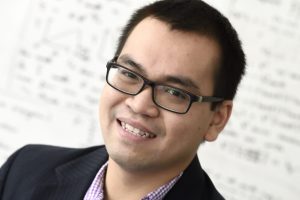
Thi Vo entered college planning to pursue a career in medicine. But a single elective in physics during his sophomore year at Rice University changed his mind, leading him to engineering.
“Physics is inspiring because it lets you start from a set of fundamental equations or a set of intuitive understanding … and derive a set of relations that allow for predictions of natural phenomenon,” he said.
As a result of that physics course, Vo connected with a faculty member whose lab focused on polymers and molecular structures—and the rest is history. He changed his major to chemical and biomolecular engineering and has never looked back.
After earning a PhD from Columbia University in 2017 and postdoctoral work at the University of Michigan, Vo joined the Department of Chemical and Biomolecular Engineering at the Whiting School of Engineering in the summer of 2022 and just completed his first semester as an assistant professor.
Vo’s research focuses on macromolecular assembly, which examines structures at the nano scale. Referencing the highly advanced self-replicating machines in “Stargate SG-1,” he explained that one of the top challenges in that field is cracking a given structure’s code so that its components perform some kind of function—a phenomena known as self-assembly.
The codes and patterns that exist organically are a guide to artificial replication. “If you know the amino acid sequence, nature has figured out a way to tune that into a specific structure,” Vo said. “The idea is now we try to get a synthetic material to do the same thing. We design them in such a way so that they spontaneously organize into some structure that we can define.” Mastering this process could expedite and enable systematic creation of a wide range of soft and functional materials—things like adaptive implants, stimuli responsive gels, newer CPUs, and semiconductors. “If we can’t predict something we can’t design it,” he said. “We figure out the new physics that explain these kinds of fundamental behaviors.”
Vo’s research relies heavily on simulations to predict how a structure may respond to an outside force. “We work a lot on the theory and computational design aspect,” he said, “so that we can pick the right parameter so that particle is organized into a structure.” The cube, for instance, is a well-known structure that behaves in a controlled and expected manner—if it is compressed or expanded, a predictable outcome occurs—but its properties may not translate to other more exotic shapes.
Similarly, a series of cubes connected by a string behave differently than a single cube, and differently than they would were they not connected. If several dice are thrown onto the floor, they scatter at random, but if they are connected by a string what happens? “That’s not a solved problem right now in terms of predictability,” Vo said.
Cubes are just the starting point—the problem of how arbitrary shapes bonded together will react is also presently unsolved. The orientation of a shape is a factor, as well; a pentagon will behave differently with its point facing up or down. This new horizon is about thinking much more outside the box—or the circle, as it were. “Physicists used to assume everything was made of spheres,” Vo said. “We’re injecting more geometry back into the system.”
In addition to his research, Vo has not only taught students but learned a few things from them as well, citing ingenuity as a common trait among undergraduates. “A lot of my students come up with completely unique and clever ways of solving a problem that I wouldn’t have thought of,” he said. “So it’s nice to see fresh perspectives from the next generation of engineers and researchers.”
Vo’s takeaway from a full semester in the classroom is that the student body itself can be a factor in its own success. “If you’re always the smartest person in the class you won’t be as motivated,” he said. “Now everyone is equally as smart as you—you’re going to be incentivized to learn and be better.” Vo’s advice for students is to work hard but not expect to know everything immediately. “Put less pressure on yourself,” he said. “Don’t stress about not getting everything right, but don’t be complacent.” Vo also emphasized the importance of taking advantage of unique and personalized research opportunities that avail themselves. The best part of being at Johns Hopkins, he said, is “the freedom you get for the research you want to do … you can find your own focus.”
Vo is actively seeking postdoctoral candidates to become part of his lab. Visit https://vogroup.wse.jhu.edu/ for more information.